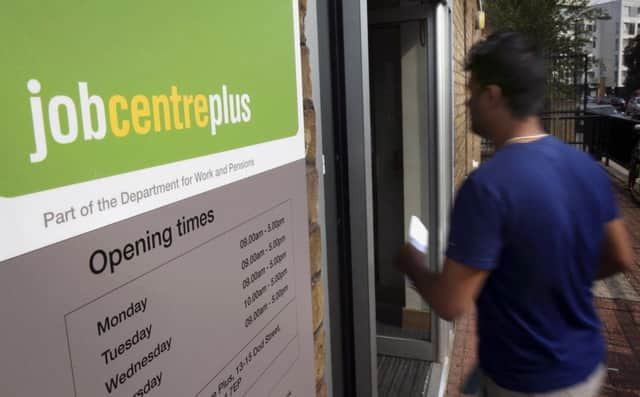Record numbers in work as jobless total falls again


The jobless total fell by 76,000 to 1.84 million in the quarter to February, the lowest for almost seven years.
In Yorkshire, the jobless tally fell by 17,000 or 6.2%, leaving 166,000 still without a job.
Advertisement
Hide AdAdvertisement
Hide AdThe number of people claiming jobseeker’s allowance fell by 20,700 in March to 772,400, the 29th consecutive monthly cut.
Other data from the Office for National Statistics (ONS) showed that more than 31 million people were in work after an increase of more than half a million in the past year, the biggest total since records began in 1971.
The UK’s unemployment rate is now 5.6%, a fall of 1.3% since a year ago. The rate was 7.9% in May 2010, when the last general election was held.
Around 1.3 million people were in part-time jobs when they wanted full-time work, up by 29,000 in the latest quarter, while self-employment was little changed at 4.5 million.
Advertisement
Hide AdAdvertisement
Hide AdThe number of people classed as economically inactive, including those looking after a relative, on long-term sick leave or who have given up looking for work, fell by 104,000 to just under nine million.
Average earnings increased by 1.7% in the year to February, 0.2% down on the previous month.
Long-term unemployment has also fallen, down by 188,000 to 623,000 for those out of work for at least a year. Youth unemployment - 16 to 24-year-olds - fell by 22,000 in the three months to February to 742,000.
The ONS also reported that 107,000 people were made redundant over the latest three months, little changed on the end of last year, but more than 200,000 fewer than the record peak of 311,000 in early 2009.
Advertisement
Hide AdAdvertisement
Hide AdThere were 743,000 job vacancies across the country in January to March, 124,000 more than a year ago and the highest since records began in 2001.
Paul Kenny, general secretary of the GMB union, said: “Most of these new jobs are mainly low-skilled, low-paid and zero hours. Even skilled workers in the UK face being undercut while wages are stagnant or falling in real terms.
“Most workers have seen little or no evidence of any recovery in living standards due to the Tories not promoting real economic growth based on investment and productivity gains.”